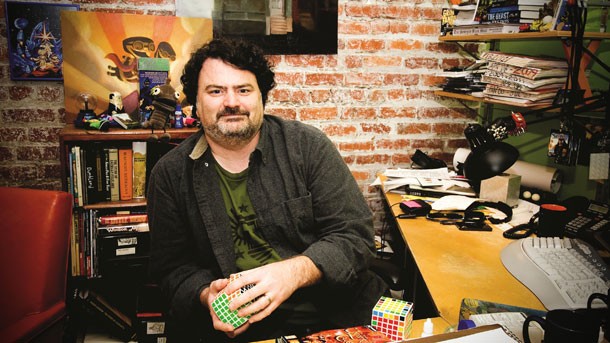Kickstarting A Revolution

(Image credit: Imagine Publishing)
Double Fine started a trend when it announced its Kickstarter adventure game project earlier this year. Franchises once thought dead and buried were given new life through the crowd-supported platform. We spoke to Double Fine founder Tim Schafer about the state of the games industry, how Kickstarter affects the studio, and where games are going.
This interview was originally printed in issue 235 of Game Informer.
------------------------------
Game Informer: What are some trends you’re noticing in the games industry right now? The console market is struggling right now.
Tim Schafer: I don’t think consoles are going away. I think people are holding their breath waiting for the new consoles to come out and not investing a lot in original franchises right now. Things that are changing are the emergence of games as a service, free-to-play, and people expecting games to be live now and stay with them. Some of the big companies have had varying degrees with how agile they are with that. Some seem to be really slow while others are embracing it very quickly. It’ll be interesting to see.
Some predict the console market will rebound once new consoles are released. Do you think about what the future holds for traditional console gaming?
It’s hard to predict what the fans want, but I can see some pressures from the inside are far as what developers want. It’s not about the hardware or the number of polygons; those are all important, but the big thing that’s driven a lot of us to PCs recently has been the openness of the platform. Consoles are much more closed and locked down. It’s harder for a smaller developer like us to make a patch.
All the things we want to do are harder right now on consoles. That’s not a technical problem, that’s a bureaucratic and a business problem. If the companies make it as appealing as things like Steam is right now for us, or the Humble Indie Bundle, those are just great places for us to put our games as a small company to actually make money.
If they can become as appealing as those things there’s no reason why the consoles can’t be just as vibrant and an exciting place to be in the future.
It’s been a few years since your studio shifted focus to create smaller games. How has that been going?
Doing smaller things has created a lot of opportunities for people in the company. The agility of it has also kept us alive in a changing market. If we had bet everything on the consoles and didn’t have anything else, that’d be scary. But we do have a mobile branch and people working on PC stuff. We’re really platform-agnostic. We’ve been able to do that because we have multiple smaller teams that can try out something new like Kinect, meanwhile another team can be investigating mobile and another team can keep our traditional Brütal Legend engine working on consoles and make something with that.
Doing smaller games has been an essential survival tool for us to be nimble and react to the industry as it changes.
Double Fine doesn’t typically do many sequels. Why is that?
Actually, Happy Action Theater is the first game to have a sequel that shipped [Laughs]. Full Throttle was a big hit and they asked me for a sequel but they didn’t push too hard. There’s always some new idea you have. There’s always some other game I want to make. Now, with smaller teams, we can do both. Somxone can work on a sequel while others are doing new games.
Has the result from your Kickstarter project been what you thought it was going to be?
It’s been great because it’s been a combination of the documentary and also our backer forums. We have this exposed, transparent production process where people are seeing the game come together and having a part in it. It was really scary at first having the cameras on while we’re having a meeting. And as we’ve had those, you get to realize the world isn’t going to end if you say something weird on camera.
You relax as you go and it’s a way I’d like to do all games now. When something great happens on another project I realize no one’s going to see that moment.
What do you think of the Kickstarter revolution going on right now?
It’s just part of this new way of doing business where creative people can interact directly with their consumers. We don’t necessarily need these big, bureaucratic companies in between us. It doesn’t completely change the industry, but it opens up the doors for a lot of projects that were previously thought of being too niche to fund.
What does the future of Double Fine hold in terms of IP ownership?
We always wanted to own our IP, and we’ve managed to do that most of the time. Except for Iron Brigade. That’s still a thorn in my side. We’ll still own our IP more and more in the future. One of the reasons why we went to smaller projects because asking for a budget for a Brütal Legend-sized game in the future, I would have to give up the IP.
If you’re basically making something and giving it away to a publisher, it’s like they hired you to mow their lawn. It’s just not the way the world should work.
What do you think the future of gaming will be like?
I’m not very good at the future – that’s why we stay as limber as possible with the company because we really don’t know what’s going to happen. I was on a panel recently with Cliff Bleszinski of Epic Games and he said VR helmets, so I’m going to say VR helmets. We’re all going to play games with VR helmets.









